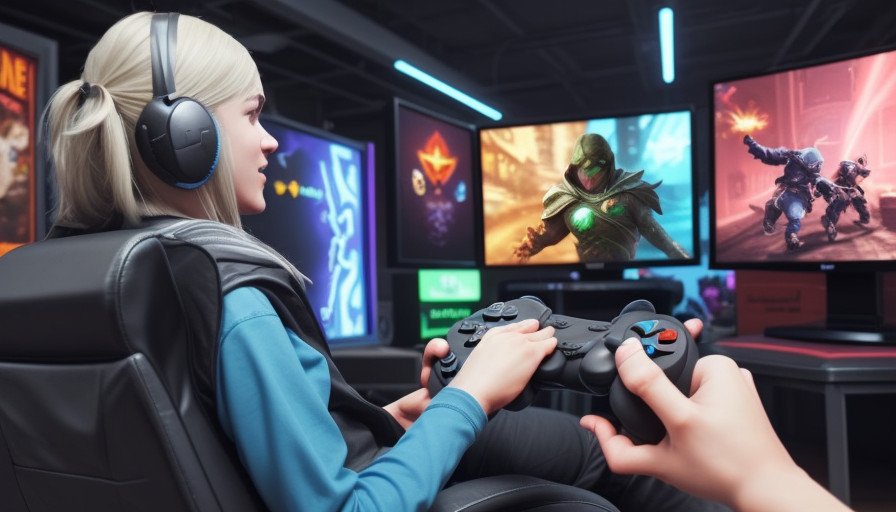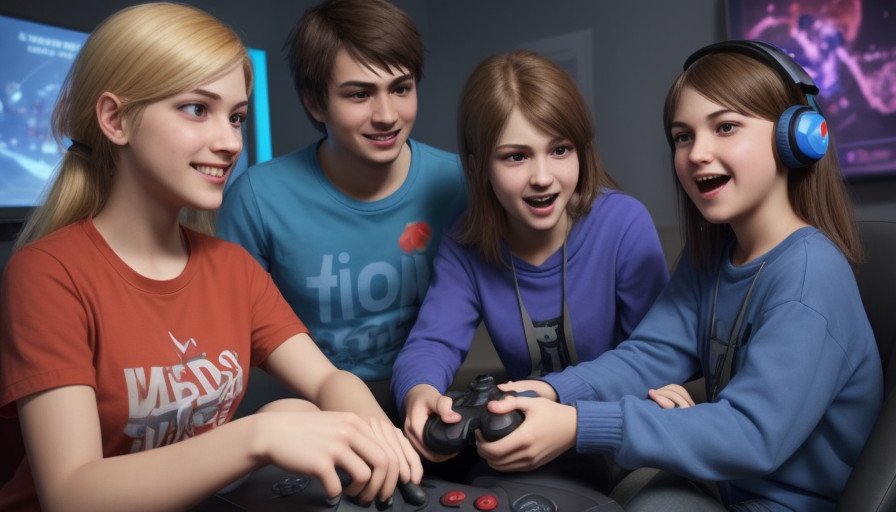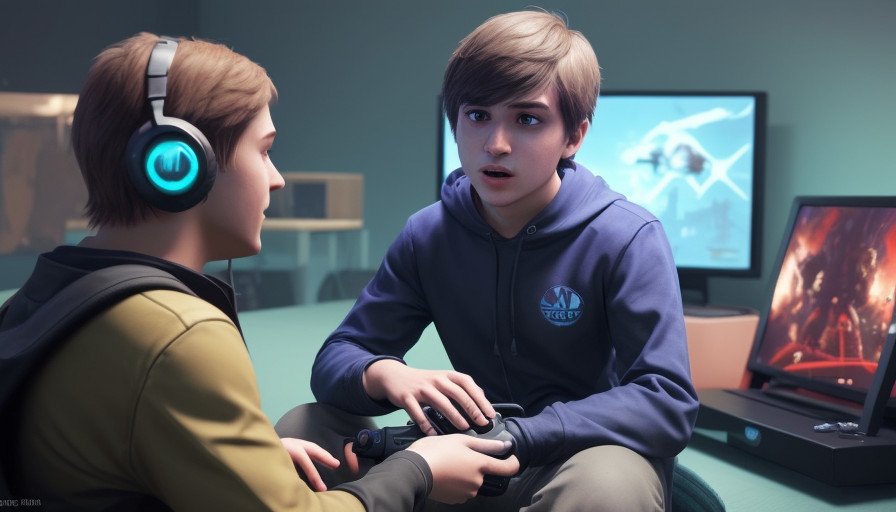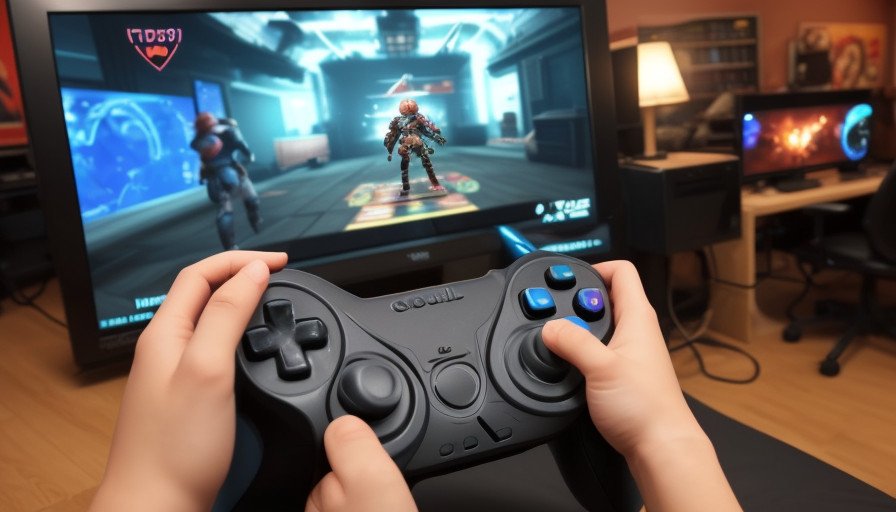The relationship between video games and social skills is complex and nuanced, with both potential benefits and drawbacks. It’s important to consider several factors before making a judgment:
Negative Impacts:
- Reduced time for real-world interactions: Excessive gaming can take up time that could be spent developing social skills through face-to-face interactions, leading to potential difficulties with communication, non-verbal cues, and empathy.
- Exposure to negative online behavior: Online gaming environments can expose players to bullying, harassment, and toxic behavior, which can hinder social development and reinforce negative social patterns.
- Addiction and isolation: In extreme cases, gaming addiction can lead to social isolation and neglect of real-world relationships, further impacting social skills.
Positive Impacts:
- Socialization within games: Multiplayer games, particularly cooperative ones, can foster teamwork, communication, and problem-solving skills within a virtual environment, which can then translate to real-world interactions.
- Building communities: Gaming communities can provide a sense of belonging and connection for individuals with shared interests, promoting social interaction and support.
- Developing specific skills: Certain games can hone specific social skills, such as leadership, negotiation, and strategic thinking, which can be beneficial in real-world contexts.
Overall:
The impact of video games on social skills depends on several factors, including the type of game, the amount of time played, and individual predispositions.
Moderate playing with a focus on positive and social games can potentially enhance social skills, while excessive or addictive gaming can have negative consequences. After this, there is another article i wrote about >>>> Do Video Games Improve Reaction Time? to learn more.
Here are some additional points to consider:
- Age matters: The impact of video games on social skills may be more significant in younger children who are still developing their social skills.
- Game content matters: Choose games that encourage positive social interactions, teamwork, and cooperation.
- Balance is key: Encourage time for both gaming and real-world social interaction to maintain a healthy balance.
By understanding both the potential benefits and drawbacks of video games, individuals can make informed choices about their gaming habits and ensure that their gaming experience enhances, rather than hinders, their social development.
I. Pixels and Playgrounds: Navigating the Social Maze of Gaming
So, you wanna know if video games warp your social skills like some pixelated black hole? Buckle up, fellow adventurer, because this ain’t a simple yes or no quest.
I’ve spent too many hours conquering digital dragons and building virtual empires to peddle simple answers. The truth, like that elusive hidden chest guarded by pixelated goblins, is way more nuanced.
Let’s start by rewinding, remembering when Pong ruled the land and pixelated squares were cutting-edge graphics. Back then, gaming was a solitary affair, a lone knight battling blocky baddies. But fast-forward to today, and the landscape’s shifted like a rogue earthquake.

Multiplayer worlds teem with life, virtual communities bustling with digital banter and collaboration. We’re forging alliances, strategizing together, and celebrating pixelated victories with a global party of fellow adventurers.
But hold on, fellow loot-hunters, before we crown video games as social saviors. There’s a flip side to this digital coin too. Remember that time you spent grinding XP instead of catching up with friends?
Yeah, me too. Those missed birthday parties and silent dinners while lost in a virtual dungeon can definitely leave a social scratch. And let’s not forget the toxicity lurking in some online corners, where flaming comments and virtual bullying can feel like a rogue troll throwing shade in your digital path.
II. Double-Edged Sword: Unpacking the Social Skill Loot
So, is it a thumbs-up or thumbs-down for video games and social skills? Well, my friend, it’s a bit like finding a legendary sword with both a damage boost and a durability curse. Used wisely, it can level up your social game; misused, it might leave you with some social hit points drained.
Let’s break it down into bite-sized loot drops:
Social Boosts:
- Teamwork Makes the Dream Work: Multiplayer games are like digital boot camps for collaboration and communication. Strategizing with your guild, leading your squad to victory, and celebrating pixelated triumphs forge real-world bonds as strong as any enchanted armor.
- Learning Through Play: Ever honed your leadership skills rallying pixelated troops? Or developed empathy navigating virtual conflicts? Games can be safe spaces to experiment with social skills, from emotional intelligence to conflict resolution, leveling up your real-world social stats.
- Finding Your Tribe: Geeking out over the same pixelated dragon? Online communities connect you with like-minded adventurers from across the globe, shattering real-world social barriers and building friendships that transcend borders.

Social Stumbles:
- Pixelated Time Warp: Let’s face it, time spent slaying digital dragons is time not spent connecting with real-life friends. Prioritizing gaming over face-to-face interactions can leave your social meter blinking red.
- Toxic Traps: The anonymity of online worlds can embolden some folks to unleash their inner troll. Flaming comments, cyberbullying, and exclusionary communities can leave you feeling like you just swallowed a potion of social awkwardness.
- Addiction’s Abyss: We all know that feeling when the real world fades away and only the next quest matters. But unchecked gaming can become an unhealthy escape, isolating you from the social connections that actually fuel your happiness.
There you have it, fellow gamer, a glimpse into the complex relationship between video games and your social skills. It’s not a linear path, but a winding quest full of potential rewards and hidden dangers.
Remember, moderation is your mantra, choosing games that foster teamwork and empathy. And always, always keep one foot in the real world, where the best loot is found in genuine connections and shared experiences.
This is just the beginning, adventurer. We’ll delve deeper into navigating this social maze soon, with tips on choosing the right games, setting healthy boundaries, and ensuring your gaming experience enhances, not hinders, your social adventures. Stay tuned, fellow gamer, and get ready to level up your real-world connections!
III. Skill Trees and Side Quests: Choosing the Right Social Path
Remember that legendary sword with its double-edged charm? Let’s pick the right enchantments, my friend, and turn video games into a social skill training ground. It’s all about choosing the right quest lines and building your character with the best social perks.
Skill Trees:
- Cooperative Quests: Ditch the lone wolf routine and grab that “teamwork makes the dream work” skill tree. Raid dungeons with your guild, strategize in MOBA arenas, or build empires together in sandbox games. These collaborative adventures are like boot camps for communication, negotiation, and conflict resolution, honing skills that translate beautifully to your real-world interactions.
- Empathy Enchants: Not all games are about shooting pixels. Choose titles that explore emotional narratives, build relationships with in-game characters, or require you to solve social puzzles. These side quests can level up your emotional intelligence, teaching you to read virtual cues, navigate diverse perspectives, and understand the consequences of your actions.
- Leadership Leveled Up: Ever led a raid to victory or rallied your team to overcome a challenging boss? Games offer a safe space to experiment with leadership. Delegate tasks, motivate your team, and learn to handle pressure under digital fire. These are skills that translate seamlessly to real-world leadership roles, from school projects to community initiatives.
Beware the Side Quests:
- Toxicity Traps: Steer clear of games known for their flaming comments, discriminatory communities, and general unfriendliness. These side quests might offer cheap thrills, but the social hit point damage they inflict isn’t worth it. Find communities that celebrate teamwork, respect, and diversity, and your overall gaming experience will flourish.
- Time-Sink Swamps: Remember, excessive grinding can leave your real-world social meter running on low battery. Set time limits, schedule “gamer breaks” for IRL connections, and stick to them. You’ll be surprised how much more fulfilling your gaming adventures become when balanced with real-world social interactions.
- Addiction Abysses: We all love that next-level loot rush, but don’t let gaming become an escape hatch from reality. If your daily life is suffering because of your digital adventures, it’s time to seek help. Talk to friends, family, or even professionals. Remember, real-world connections are your most valuable treasures, and neglecting them for pixelated loot is never worth it.
IV. Balancing Acts: Making Gaming a Social Catalyst
So, how do we ensure video games enhance, not hinder, our social lives? It’s all about the delicate art of balance, like mastering that tricky combo move in your favorite fighting game. Here’s the game plan:
Moderation Mantra: Treat gaming like a power-up, not a replacement for real-world connections. Set achievable time limits, stick to them fiercely, and prioritize face-to-face interactions. Remember, the best side quests involve real people, not just pixelated ones.
Family-Friendly Fun: Turn gaming into a shared experience! Play party games with family, co-op adventures with friends, or even tackle the latest puzzle game together. Sharing laughter, frustration, and triumphs over digital challenges can strengthen real-world bonds and create lasting memories.

Real-World Reflects: Use gaming as a springboard for real-world connections. Discuss in-game experiences with friends, analyze character dynamics, or even draw inspiration for creative projects. Let the lessons learned in virtual worlds spill over into your real-life interactions, making them richer and more meaningful.
Remember, fellow gamer, the key to mastering this social maze is embracing the possibilities while acknowledging the pitfalls. Choose wisely, play in moderation, and most importantly, keep one foot firmly planted in the real world.
With the right approach, video games can become a catalyst for social growth, forging friendships, fostering teamwork, and teaching valuable life lessons. So, grab your controller, adventurer, and let’s level up our social skills together!
I hope this continuation dives deeper into navigating the social aspects of gaming. Remember, this is just a starting point, and there’s always more to explore in this ever-evolving landscape. Happy gaming, and happy connecting!
V. Beyond the Binary: Unveiling the Nuanced Picture
Alright, fellow gamers, let’s ditch the black and white thinking and paint a more nuanced picture of video games and social skills. It’s not just a thumbs-up or thumbs-down situation, but a complex tapestry woven with both threads of potential benefits and drawbacks. To truly understand this dynamic, we need to ditch the binary and embrace the shades of gray.
Here’s a table to shed some light:
| Factor | Potential Benefits | Potential Drawbacks |
|---|---|---|
| Time Commitment | Provides an outlet for creativity and relaxation, fosters shared experiences with friends and family. | Can lead to social isolation if excessive, may detract from important real-world responsibilities. |
| Content and Genre | Games promoting teamwork, empathy, and problem-solving can enhance social skills. | Games characterized by toxicity, violence, or negativity can negatively impact social behavior. |
| Individual Predispositions | Players with strong social skills can leverage games to further develop them. | Individuals struggling with social skills might find their challenges exacerbated in certain online environments. |
| Playing Context | Playing with close friends and family can strengthen real-world connections. | Engaging in toxic communities or anonymous online interactions can lead to negative social experiences. |
Remember, every individual’s experience is unique, and the impact of video games on social skills will vary depending on a multitude of factors. The key takeaway is to approach gaming with mindfulness and awareness, making conscious choices about the games you play, the time you invest, and the communities you engage with.
VI. The Future of Play: Crafting Social Gems
So, where do we go from here? How can we shape the future of gaming to maximize its potential for positive social development? Let’s brainstorm some ideas:
- Prioritizing Inclusivity: Games that foster empathy, understanding, and respect for diverse perspectives can bridge social divides and promote a more inclusive gaming landscape.
- Championing Positive Communities: Encouraging communities built on teamwork, collaboration, and positive communication can create safe spaces for players to learn and grow socially.
- Integrating Real-World Connections: Designing games that encourage players to apply their in-game skills to real-world social interactions can further bridge the gap between virtual and tangible worlds.
- Promoting Parental Guidance: Educating parents and guardians about the potential social impacts of video games can equip them to guide their children’s gaming experiences and mitigate potential risks.
- Embracing Responsible Design: Game developers have a crucial role to play in creating games that prioritize positive social values, promote healthy interactions, and offer tools for managing screen time and preventing addiction.
Ultimately, crafting a future where video games become catalysts for social growth requires a collective effort from players, developers, educators, and parents. By working together, we can ensure that the future of play is one filled with connection, collaboration, and the potential to enrich our social lives both online and off.
Remember, fellow adventurers, the game of life is complex, and video games are just one aspect of it. Approach them with a lens of curiosity, awareness, and responsibility, and let them be a force for good in your social landscape. Happy gaming, and happy connecting!
This concludes our journey through the complex relationship between video games and social skills. I hope this exploration has equipped you with valuable insights and actionable tips for navigating this ever-evolving landscape.
Now, go forth, conquer your social quests, and remember, the most valuable loot lies not in pixelated chests, but in the genuine connections we forge along the way.
VII. Beyond Words: Visual Aids for a Deeper Dive
Alright, gamers, let’s take our exploration one step further. While words paint a picture, sometimes visuals do it even better. So, grab your pixelated popcorn and prepare to feast your eyes on some informative treats!
Visualizing the Impact:
- The Time Prism: Imagine a prism refracting sunlight into a spectrum of colors. Each color represents a different amount of time spent gaming. The brightest, closest to the sun, might be casual play in moderation, enhancing social skills with its collaborative fun. As the colors shift towards darker shades, we encounter excessive gaming, potentially leading to social isolation and neglecting real-world interactions. Remember, finding the optimal balance, that sweet spot between light and shadow, is key to unlocking the positive social potential of gaming.

- The Genre Garden: Picture a vibrant garden, each flower representing a different game genre. Cooperative games, like blooming sunflowers, radiate teamwork and communication. Educational titles, like blossoming cherry trees, nurture skills like empathy and problem-solving. But beware the thorny bushes of toxic online communities and violent games, their dark leaves hinting at potential negative social impacts. Choosing the right flowers to cultivate in your gaming garden is crucial for nurturing a healthy social ecosystem.
- The Skill Tree Tableau: Imagine a towering oak tree, its branches laden with leaves depicting various social skills. Teamwork, negotiation, and leadership abilities might be golden acorns nestled close to the trunk. Empathy and emotional intelligence could be delicate orchids blooming on higher branches. By choosing games that nourish these branches, we can climb the social skill tree with video games as our guide.
These are just a few ways to visualize the multifaceted relationship between video games and social skills. By engaging our visual cortex, we can deepen our understanding and make informed choices about our gaming habits.
Remember, fellow adventurers, it’s not just about pixels and polygons, but about the social landscape we choose to cultivate through our gaming experiences.
VIII. Conclusion: Game On, Grow On!
So, we’ve reached the final boss level of our epic quest! We’ve delved into the complexities, tackled the nuances, and equipped ourselves with a treasure trove of insights. Now, the ultimate challenge lies before us: applying this knowledge to craft our own unique gaming journeys.
Remember, fellow gamer, there’s no one-size-fits-all answer to the video game and social skills conundrum. It’s an ongoing quest, a continuous experiment in balancing pixels with people.
Embrace the power of choice, curate your gaming experiences with mindfulness, and prioritize real-world connection. Use these tips as your trusty weapon, these visuals as your guiding map, and your own personal experience as your compass.
Game on, fellow adventurer, and grow on! May your social skills flourish, your friendships bloom, and your digital adventures weave stories of connection, collaboration, and joy. Remember, the real-world loot awaits, and the most epic quest of all is the one we forge together, both online and off.
Bonus Tip: Share your own experiences and insights in the comments below! Let’s build a community of informed gamers, striving to navigate the social maze of gaming together. Together, we can rewrite the narrative, showing the world that video games can be catalysts for positive social growth, not just pixelated playgrounds.
So, adventurer, what are you waiting for? Power up your controller, grab your friends, and let’s make the world a more connected, inclusive, and fun place, one pixel at a time!
I hope this visual and interactive conclusion gives you a satisfying sense of closure while also encouraging further exploration and community building. Remember, the game of life, and the quest for positive social development, never truly ends. So, keep playing, keep growing, and keep connecting!
What are the social issues of video games?
Video games, like any form of media, can present a range of social issues. Here are some key concerns:
- Toxicity and harassment: Online gaming communities can sometimes foster toxic environments with flaming, bullying, and discriminatory behavior. This can negatively impact self-esteem, mental health, and overall social experiences.
- Addiction and time commitment: Excessive gaming can lead to neglecting real-world responsibilities, social interactions, and even physical health. It’s important to find a healthy balance and maintain awareness of potential addiction.

- Gender and racial representation: Stereotypes and biases can be present in character design, storylines, and gameplay mechanics. This can contribute to social inequalities and harm underrepresented groups.
- Social isolation and disconnection: While games can facilitate connection, excessive play can also lead to social isolation from friends and family. It’s crucial to maintain a healthy balance between virtual and real-world interactions.
- Violence and aggression: Some games depict violence in a way that can desensitize players or even encourage aggressive behavior. It’s important to be mindful of the content and its potential impact, especially on younger audiences.
These are just some examples, and the specific social issues can vary depending on the game, the player, and the surrounding environment.
How do video games affect your personality?
Video games can both positively and negatively influence personality traits. Here are some potential effects:
- Positive:
- Teamwork and collaboration: Cooperative games can enhance communication, leadership, and negotiation skills.
- Problem-solving and critical thinking: Many games require strategic thinking and creative problem-solving, potentially honing these skills.
- Empathy and emotional intelligence: Some games explore emotional narratives and character relationships, encouraging players to develop empathy and understand diverse perspectives.
- Negative:
- Aggression and hostility: Games with overly violent themes or aggressive gameplay mechanics may unintentionally increase aggressive tendencies in some players.
- Impulsivity and lack of patience: Fast-paced games requiring quick reactions may influence players to become more impulsive and less patient in real-world situations.
- Social anxiety and isolation: Excessive gaming can lead to neglecting social interactions and potentially developing social anxiety or isolation.
It’s important to remember that the overall impact on personality is complex and dependent on individual factors like pre-existing traits, the type of games played, and the amount of time spent playing.
How does video gaming affect society?
Video games have become a major global industry with significant social and cultural impacts. Here are some key points:
- Positive:
- Community building and connection: Online gaming communities can foster positive connections, friendships, and shared interests across geographical boundaries.
- Educational and creative potential: Educational games can enhance learning, while creative games can spark imagination and problem-solving skills.
- Cultural expression and storytelling: Games can act as powerful storytelling platforms, exploring diverse themes and representing various cultures.
- Negative:
- Stereotypes and prejudice: Some games may perpetuate harmful stereotypes and contribute to existing biases in society.
- Violence and desensitization: Concerns exist about the potential for violent video games to desensitize players to real-world violence.
- Health concerns: Excessive gaming can negatively impact physical health, sleep patterns, and eye strain.
Overall, video games offer a complex mix of potential benefits and drawbacks for society. It’s important to acknowledge both sides, encourage responsible gaming habits, and strive to create an inclusive and positive gaming culture.
Remember, these are just brief summaries, and further exploration of these topics can reveal their rich complexities and nuances. By approaching video games with a critical and informed perspective, we can maximize their positive social impact and minimize any potential downsides.






